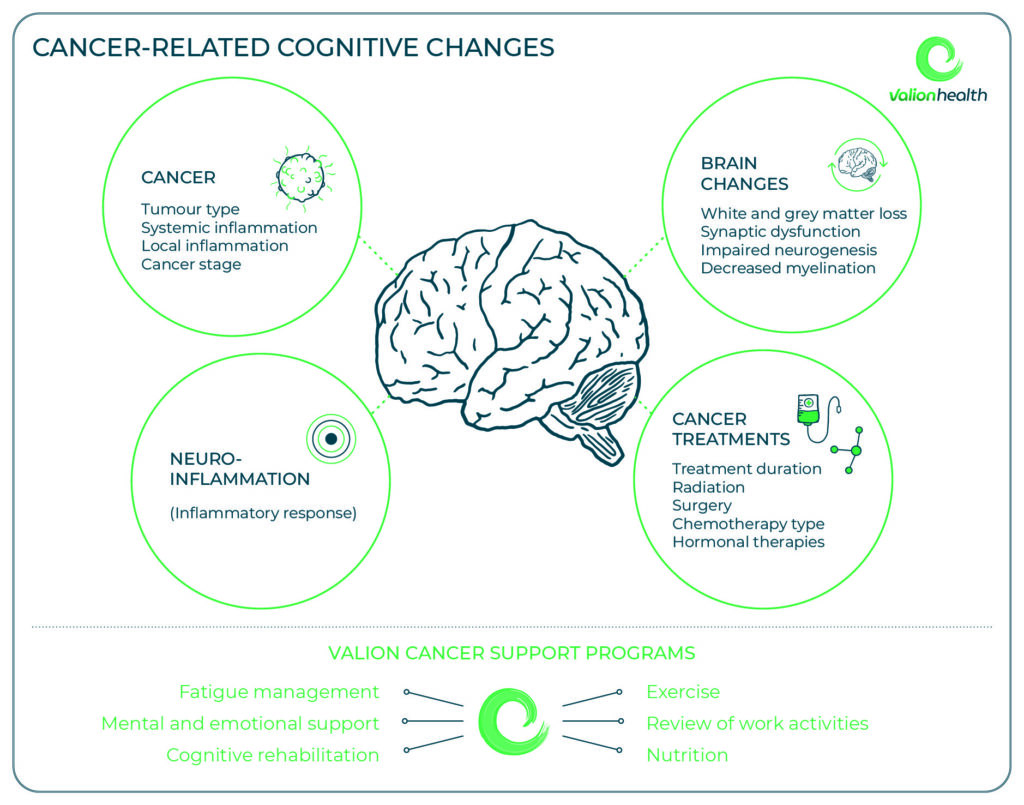At the end of this module, you will:
What is cancer-related cognitive change?
You may have heard, or even used, the phrase ‘chemo brain’. Chemo brain is a term commonly used to describe thinking and memory problems experienced during or after cancer treatment. But changes in cognition aren’t specifically related to chemotherapy, and can happen before treatment commences, which is why the correct medical term is cancer-related cognitive impairment (CRCI).
CRCI involves a decline in cognitive functions, such as perception, attention, language, thinking, learning and memory, action planning, understanding, reasoning and problem solving. CRCI is very common, with approximately 30% of cancer patients experiencing cognitive change prior to treatment, and up to 75% reporting changes during treatment.
Signs and Symptoms
CRCI can present differently in people, but you may notice changes or difficulty with:
If you notice any of these changes, speak to your clinician during your next session.
What causes cognitive change?
How long do the changes last?
How long cognitive challenges last varies from person to person. It depends on factors including; the type of treatment you received, the duration of your treatment, your current level of mental health and other psychological factors such as trauma, anxiety and depression, other side effects or symptoms such as unmanaged pain, and medications that you may be prescribed.
Cognitive changes are often a lasting effect of cancer treatment that can impact people from months to years post treatment. While cognitive changes might be inevitable, there are definitely things you can do to support your thinking and concentration.
TIPS: Managing cognitive changes
Cognitive changes can impact your quality of life and emotional well-being, as well as interfere with your family or work roles and social life. Below are some ways in which cognition can be managed to reduce the impact on your everyday life. We encourage you to speak to your healthcare professional about the changes you are experiencing so they can identify the causes and work with you to establish a plan to address these.
 |
Brain Games
Programs such as Brain HQ or Luminosity are like the gym for your brain, and can help keep your brain active in new ways. To see cognitive improvement, regular and consistent use of these programs is required; for example 30 minutes twice a week for 10 weeks (up to 40 hours). |
 |
Helping Hands
Compensatory strategies such as alarms, diaries, scheduling, post-it notes, memory aides, task variability in work and switching between cognitive domains (i.e., reading, speaking) can help stimulate memory and concentration. |
 |
Attention Training
Mindfulness of sound can develop your capacity for focus and remaining in the present (reducing distractions). Additionally, it can improve your ability to switch attention more flexibly. |
 |
Managing Emotions
A cancer diagnosis takes a toll mentally. But strong emotions such as stress, self-criticism and self-frustration can worsen cognitive performance and create secondary experiences such as anxiety and depression. Chatting with your psychologist about your emotions, and ways to manage difficult times, can help reduce their impacts. |
TIPS: Ways to improve your concentration
Concentration is the key aspect of managing memory and cognitive performance. It is the ability to stay focused on your work without letting people, feelings, thoughts, or activities get in the way. When we have difficulty establishing and maintaining attention and focus, we are unable to remember or store information to recall later, and retrieving information such as words or objects can be difficult.
ACTIVITY: What is my concentration span?
Figure out how long your concentration span is. To do this, write down the time you start a task (such as reading). As soon as your mind starts to drift, write down the time again. The length between your start and end times is your concentration span.
Below are just some ways you can work on your concentration levels.
| Create Concentration | Improve Concentration |
|---|---|
| Remove external distractions where possible. For example, give yourself permission to put your phone on silent or have your voicemail answer calls. | Learn when your concentration level is at its best. Find a time during the day when you know you won’t be interrupted, and your energy level matches the task. Then set aside time. Imagine how you may feel or what you may accomplish after your task is done. |
| Keep a notebook or pad or paper handy. If something you need to do pops into your head in the middle of a task, write it down to get it off your mind and schedule time later in the day to do it. | Use a pencil or highlighter when reading. Take notes or highlight important points. |
| Talk under your breath (yes you read that right) to help maintain focus or create an auditory cue. For example; you parked in Blue B6 (repeat a few times). | Plan breaks according to your concentration span. Take a walk or a lunch break to help clear your head. |
| Divide tasks into smaller, more manageable parts. | If you find yourself losing focus, stand up. The physical act of standing brings your attention to the fact that you’re losing focus. |
Diet and exercise are crucial to both creating and improving concentration. The below are strategies to try:
Key Takeaways
- Cancer related cognitive impairment (CRCI) is a medical term used to describe a decline in cognitive functions, such as perception, attention, language, thinking, learning and memory, action planning, understanding, reasoning and problem solving.
- CRCI is very common, and its duration varies from person to person, taking into consideration their diagnosis, treatment length and overall wellbeing (such as mental health and physical health).
- There are things you can do to manage cognitive changes and improve your concentration.
- If you notice cognitive changes, chat with your health professional to put together a plan to address the challenges using some of the suggestions in this module.
Resources and Further Reading
Below are some useful resources (some mentioned throughout this module) to help manage cognitive changes.
- ANBrain HQ: brainhq.com
- Luminosity: lumosity.com/en
- Tibetan Bowls for sound meditation
If you would like to know more about CRCI, below are some recommended articled and videos. Some of these may be quite technical, so if you have any questions, be sure to write them down and bring them to your next session.
| Cognitive Changes in Cancer Survivors.
2018. American Society of Clinical Oncology. |
|
| Cognitive rehabilitation for cancer-related cognitive dysfunction: a systematic review.
2019. Support Cancer Care. |
|
| Cancer-related cognitive impairment: an update on state of the art, detection, and management strategies in cancer survivors.
2019. Annals of Oncology. |
|

